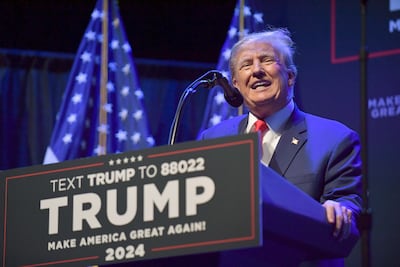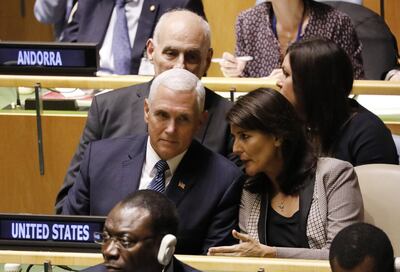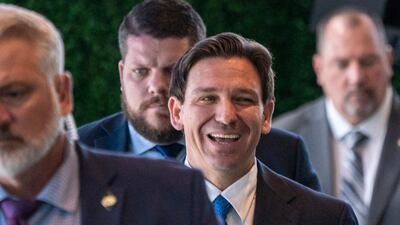In the US, Republicans skeptical of former president Donald Trump seem trapped in a nightmarish doom loop. Nothing, it seems, can be done to stop him from once again becoming their party's nominee for president in 2024, and then probably losing to President Joe Biden.
Mr Biden is expected to announce his re-election campaign this week, and he is unlikely to face any serious Democratic challengers. Mr Trump faces several announced competitors while numerous other hopefuls are biding their time. This suits him ideally.
He can rely on about 20-30 per cent of the party's base voters. Unless another candidate in the pack secures higher numbers, the Republican winner-take-all primary system will transform that sizable minority into unstoppable victories. You don't need 50 per cent plus one. To win all of a state's delegates, you just need one more than a runner-up. So, Mr Trump relishes a crowded field.
But are Republicans doomed to eventually nominate Mr Trump again? Can anyone plausibly stand in his way?

For a few months, conventional wisdom held that Florida Governor Ron DeSantis was not only a formidable challenger, but had Mr Trump back on his heels, clocking significant leads in most opinion polls.
But many Republicans focused on regaining the White House watched in horror as that lead rapidly dwindled and then reversed, with Mr Trump re-building commanding advantages in virtually every poll. Yet Mr DeSantis hasn't even announced he's a candidate. How did that happen?
The early excitement over the Florida Governor failed to account for several key factors. Mr DeSantis is totally untested on the national stage and looked distinctly unimpressive during a recent book tour that was a proxy for an early campaign.
Presidential elections are, in fact, popularity contests. Mr DeSantis is, by most accounts, a decidedly unpleasant individual, lacking personal charm, particularly in close quarters. Unfortunately, he also lacks Mr Trump's formidable demagogic talents in front of large crowds, and so appears effective neither with big nor small groups.
His most obvious competitive advantage over Mr Trump, 76, is Mr DeSantis' relative youth at 44. Those decades could be a potent weapon against Mr Biden, but we may never find out.
The two have launched very revealingTV attack ads against each other. Mr DeSantis criticised Mr Trump for having been open to cuts in social spending for the elderly. Mr Trump responded by mocking Mr DeSantis' purported use of his fingers to consume pudding on an airplane when he didn't have a spoon.
Mr DeSantis apparently imagines he can win the Republican nomination on policy issues. Mr Trump knows it's all about shamelessly asserting dominance with impunity. He shares his followers' belief that leadership is most clearly demonstrated through bullying in a style borrowed from professional wrestling.
However, Mr Trump has been, as usual, canny. Since leaving office after refusing to acknowledge his defeat and seeking, instead, to overthrow the constitutional system, he has plunged into new depths of extremism. But this was not merely a neurotic symptom.
He has been carefully mapping out new space on the extreme right that has never existed in mainstream American politics – vowing to dismantle much of the government and take bitter revenge against opponents if re-elected, in the spirit of his insistence that the US Constitution should have been "terminated" to allow him to remain in power. Judged by both word and deed, he now poses a far greater threat to the constitutional order than in 2016 or 2020.
In the process, he has blocked any path by which he could be attacked from his political right. What would that look like? What's more extreme than "terminating" the Constitution and seeking "retribution" against opponents? Yet no one can win the Republican nomination by attacking him from his left. He has cleverly both outflanked and boxed in his Republican opponents, leaving them little room to manoeuvre.
It is hard not to suspect Mr DeSantis has squandered his big opportunity and his path to a comeback is not clear.
Former UN ambassador Nikki Haley shows even fewer signs of gaining significant support. Before almost any of the others, she exemplified the conundrum all Mr Trump's Republican opponents face: she feels the need to be perceived as sufficiently pro-Trump not to completely alienate his huge support base, but somehow also needs to make the case that she’s a better choice. That's very tricky. Since leaving her post in his administration, she's been trying to square that circle, with no success.
Her best bet is for Republicans to conclude they need a woman of colour to erode Democratic support among women and ethnic minorities. But, like all the others, since she is stridently anti-choice, abortion's rise as a dominant issue is disastrous for Republicans in general, and Ms Haley in particular.

The rest of the announced field includes a couple of wealthy non-entities and a trivial talkshow host. But there are some more interesting unannounced candidates, particularly Senator Tim Scott of South Carolina. He is the most prominent African-American Republican, with a style that's essentially a mashup of the Trump/DeSantis brand of dour culture war politics but with a sunny disposition and uplifting tone. His best bet is probably for Mr Trump to lead the party into another atrocious debacle in 2024 and try again in 2028, when there may be more takers.
He can rely on about 20-30 per cent of the party's base voters. Unless another candidate in the pack secures higher numbers, the Republican winner-take-all primary system will transform that sizable minority into unstoppable victories. You don't need 50 per cent plus one.
Mr Trump is also facing an unannounced challenge from his former vice president Mike Pence. The stigma of having followed the Constitution on January 6, 2021 and not unlawfully blocked the certification of Mr Biden's victory has led to Mr Pence being vigorously booed by core Republican audiences in many recent public appearances. Perhaps he'll think better of it after all.
Yet even he won't strongly criticise Mr Trump. That's being left to one declared candidate, former Arkansas Governor Asa Hutchinson, and an undeclared one, former New Jersey Governor Chris Christie. Neither seem particularly formidable, to put it charitably.
It's very early, and things could change. But it doesn't look as though even criminal trials, or for that matter convictions, are going to be enough to derail Mr Trump. Yet it would probably take a huge unexpected development to create enough space for him to regain the presidency in 2024.
There's a long way to go, but right now Mr Biden looks incredibly well-positioned for a second term in the White House.


